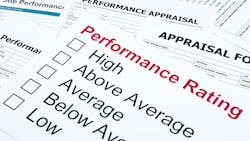The dreaded yearly performance review. Nobody likes them, and nearly everyone hates them. Yet everybody is told to do them, year after year.
The most common argument in favor of annual performance reviews is that they represent documentation that can be used to help defend an employer’s actions, mostly in the case of terminations. The fine print, however, is that performance reviews must be done well. Unfortunately, it’s the “done well” part that can be the problem.
Negatively critiquing an employee, even when justified, is hard, especially when you have to work side by side. This prevents reviews from being honest and accurately reflecting an employee’s performance. It also prevents performance reviews from accomplishing their intended purpose, namely, to improve performance.
More HR reading
Fast forward to a lawsuit and the plaintiff’s attorney subpoenas all documentation, which includes performance reviews. The doctor, of course, contends that the employee was fired for performance. What will the plaintiff’s attorney do with a performance review in hand that doesn’t accurately reflect the employee’s performance and effectively minimizes the poor performing aspects?
Adding to that, consider these studies:
• 87% of employees found traditional performance reviews to be ineffective; 94% of chief executives agreed.
• 30% of performance reviews ended up in decreased employee performance.
• 58% of bosses said they don’t think performance reviews are an effective use of time.
Finally, consider this. In an article titled “The Legal Case for Eliminating Performance Reviews” by Judith Droz Keyes, Esq., the author states, “In writing this article, I did a simple word search for ‘performance evaluation’ or ‘performance review’ in published decisions only in the federal and state courts in California and only for a six-month period. There were 40 decisions where the performance review was cited by the court as a material fact in the case. In all but one of the cases, the review was cited not by the employer to support its defense but by the plaintiff-employee to provide his or her claim.”
The bottom line is, your performance evaluation system is most likely not helping or protecting you. Add to that the fact that generations Y and Z represent the majority of today’s workers, and they expect instant feedback, data, and information. Waiting a year to provide an evaluation makes no sense.
Ongoing feedback
Nothing should be saved up and nothing should be a surprise. When something is noticed about an employee’s performance today, either good or bad, it should be communicated to the employee. We recommend praising in public, and critiquing in private.
Goal setting
A better and more contemporary future can be accomplished through goal setting. Why goals? First, they are a proven way to support employee accountability. Second, goals will enlist and engage employees in contributing to the success of the practice. When done right, goal setting and monitoring create a constructive dialogue about the most important behaviors that are tied to the practice’s most desired results.
Disciplinary documentation
Sometimes employers must move toward a more formal system of documenting and addressing problems. By using an employee counseling document, doctors can address problems at the same time they establish documentation. This type of documentation should:
• state the reason for the counseling in specific, factual, scrupulously honest, and concise terms;
• outline the specific nature of the discipline;
• describe the corrective action expected of the employee in specific, measurable terms;
• warn of potential consequences if the employee fails to improve; and
• include signatures and dates from all parties involved.
Incorporating this kind of documentation process into the performance management picture is nothing new. The difference now is that without a performance evaluation form, there is less chance that the employer has other contradictory documentation on file to negate the effectiveness of this documentation.
It could be to let go of the age-old performance review system and move on. This is not an argument for doing nothing. This is about replacing the old with something new, better, and more in line with the business as a whole. The bonus is that it may put doctors in a stronger position should they find themselves having to defend their actions.
Editor's note: Originally posted in 2022 and updated regularly
About the Author

Rebecca Boartfield, SHRM-SCP
Rebecca Boartfield, SHRM-SCP, is an HR compliance consultant for Bent Ericksen & Associates. For more than 40 years, the company has been a leading authority in human resources and personnel issues, helping dentists successfully deal with ever-changing and complex labor laws. To learn more, call (800) 679-2760 or visit bentericksen.com.
